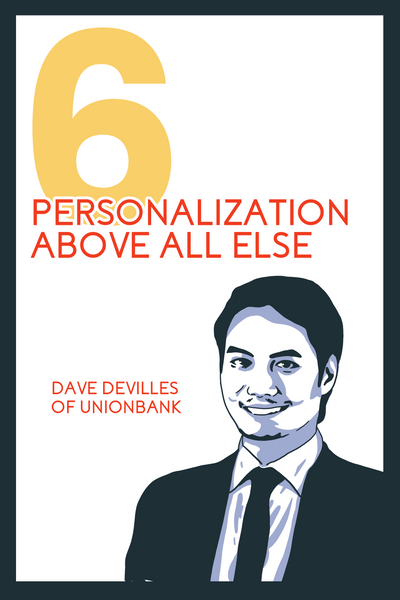
An Introduction to Sustainability Initiatives in the Workplace
The following is an excerpt from The Evangelists: Insights from Leaders of the Nation’s Most Beloved Brands. Written by Micah Avery Guiao, this chapter is titled “Personalization Above All Else.” In it, Dave Devilles, the VP of Sustainability, Corporate Social Responsibility, and Employee Relations at UnionBank of the Philippines, is interviewed about how the organization executes its strategy in Personalization Above All Else.
Communicating Sustainable Practices to Employees
Although his background focused mainly on public administration, Dave Devilles’ career shift towards the corporate communications field proved fruitful. Currently, he works as the VP of Sustainability, Corporate Social Responsibility, and Employee Relations at UnionBank of the Philippines.
As part of the UnionBank team, he believes his role is to authentically embed sustainability initiatives that are in line with the company’s digital thrusts. Devilles stated that one goal of theirs was to transform the way sustainability is understood and practiced in a bank. Due to the banking sector’s low or almost zero direct environmental impact, banks do not normally view sustainability as a part of their strategic program. Beyond the usual acts of environmentalism, such as encouraging recycling or using segregated trash cans, the company makes it a point to view the concept as an opportunity for growth: “Sustainability is not just about the environment; it is also about creating socio-economic opportunities for our stakeholders and customers and developing products to make a long-lasting impact, and in UnionBank’s case, our sustainability thinking will focus more on co-creating innovation that will benefit not just our customers but also our fellow Filipinos.”
More than marketing UnionBank’s position on sustainability to the public, his job required him to make the employees fully embrace the importance of the message he is carrying out externally. No matter how well-publicized a company’s corporate social responsibility program is, the goal is not met if employees themselves are not aware of what is being enacted.
If there’s anything Devilles wishes to impart to those who aspire to thrive in the communications field, it’s that internal communication should be prioritized before anything else. There is a need to strengthen the company’s foundation before widening their reach. Every brand needs its own “authentic advocates.”
Instead of putting focus on publicizing sustainability programs, consider the people already present in the company and sell the idea to them—internal stakeholders can make a powerful impact on how your brand is seen and known. Devilles called this a concentric communication strategy: “Begin with a small group that can become your first mover, a small circle that can expand into bigger ripples.” At surface level, internal communication seems too easy a solution, but it’s one Devilles has always thought of as overlooked.
“Before we even launch externally, we communicate these ambitions to our internal stakeholders as we inspire them to become our sustainability champions,” he said. “We latched on to a shared value where the impact is not merely reach or likes but a mindset that is translated to brand loyalty and ultimately a bankable reputational capital.”
For him, there are two important aspects: first is knowing the company’s key message and second is identifying which platforms to use. One of his projects, the Aboitiz No Impact Challenge (ANIC), was a company-wide effort aimed to laymanize sustainability, particularly carbon footprint reduction, among each of its employees (after all, Aboitiz is one of UnionBank’s parent companies and Devilles previously served as Assistant VP for Corporate Communication and Sustainability for Aboitiz Equity Ventures, Inc). More specifically, it was created to drive home how small lifestyle changes can lower people’s amount of carbon footprint. After a successful pilot run in 2016, the program later expanded across five Aboitiz Strategic Business Units throughout the Philippines.
Like many others, the ANIC used the core values of teamwork, integrity, responsibility, and innovation to guide its campaign. These words are not foreign to corporate sustainability departments, yet most companies fail to get the word out to its employees. Part of the problem lies in how abstract these terms are. The complex nature of a term like innovation, for example, makes innovation sound like a company problem instead of something that ought to be applied personally. In the ANIC, what Devilles and his team did differently was encouraging small lifestyle changes as it emphasized the role of the individual. Grounding this goal to reality, it translates carbon footprint reduction as small lifestyle changes. Packaging the key message as something digestible, it then becomes a “viable segment” that is doable, concrete, and easy to achieve. Thus, the key message of the campaign is that “little things we do create a better world.”
But one size does not fit all. Devilles claimed that the broadcast communication of yesterday where one unified message is transmitted is no longer effective today. More than making the program known by briefing stakeholders through email, other platforms deemed necessary for its implementation and overseeing should be utilized. In the case of the ANIC, they didn’t just stop reaching out using a multi-channel approach—they created numerous initiatives rolled out in several platforms, each aligned to deliver a common participant experience. While other companies heavily rely on a single platform like Facebook, Devilles and his team employed promotional videos to encourage active participation, town hall meetings to administrate meaningful discussions, and online registration forms to simplify the collection of data, and later on even developed a chatbot and digital leader board to make the experience more friendly to the participant.
Despite these efforts, he warned against “the gleam of sophisticated tools” that platforms offer. At the end of the day, the message being relayed is still what matters most. There is a new aspect of personal engagement that has become crucial in the process of how each company markets its brand both internally and externally. Identify the right stakeholders, then adjust the message accordingly. For instance, Aboitiz team members were targeted as the primary stakeholders in the ANIC, with the family and friends of these members acting as secondary stakeholders. As more people are roped into the campaign, marketing communicators must be able to personalize approaches for stakeholders that each have functions and needs of their own. In doing so, those who are involved feel connected to and responsible for the campaign as the idea resonates with them. On some occasions, it may be necessary to laymanize the ideas presented. Creative measures should not go untapped as well—gamifying the initiative is one common way to promote campaigns.
From key message to key platform, the way information is passed on within the company should also be taken into account. Steering away from the traditional top-down flow of information, Devilles also urged companies to change the way they interact with all levels of the organization: “To engage, retain, and tap into the knowledge and insights of your stakeholders, two-way and bottom-up communication is vital.”
Today, ANIC has kickstarted many earth-friendly habits among the Aboitiz team members and their respective families. The “no-soda” challenge has been used as one of the inspirations of a wellness program of human resources, car pooling has been formalized in internal group chats, and company events are now designed and implemented with no plastic utensils (employees were encouraged to bring their own water tumblers on the last three company-wide tree planting activities). In the communication industry, ANIC has earned the top award in communication management in the 2018 Philippine Quill Awards, garnering the highest recognition from among its peers. This program demonstrates the clear role marketing communications played in strengthening UnionBank’s push to become a more responsible, sustainable organization.
To get more insights from other marketing leaders like Dave Devilles, please check out the full book, available for purchase here.
The Evangelists - and other business books about the Philippines and Asia Pacific - will soon be streaming on Audiophile, our platform for exclusive Filipino audiobooks.


